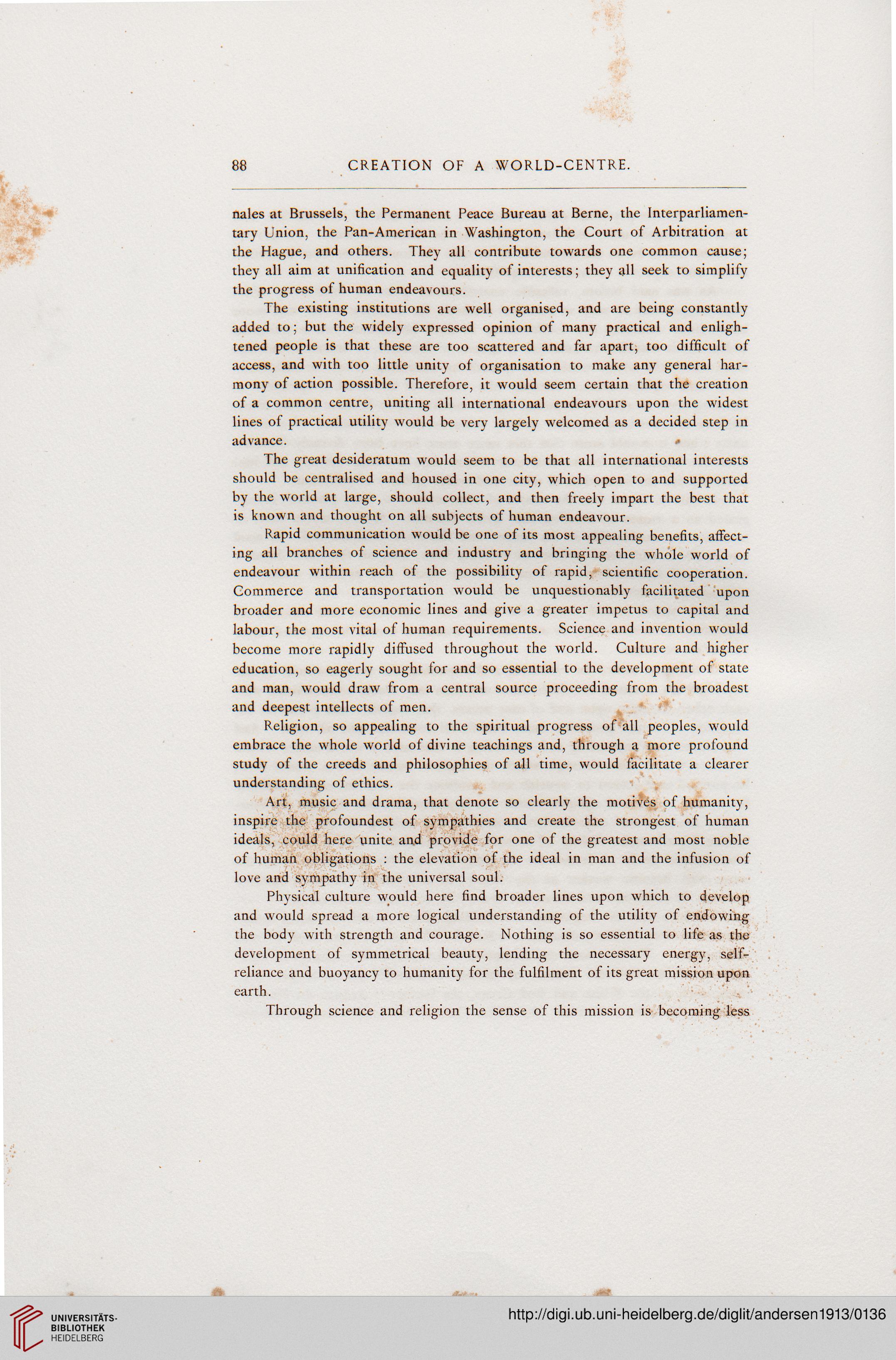88
CREATION OF A WORLD-CENTRE.
nales at Brussels, the Permanent Peace Bureau at Berne, the Interparliamen-
tary Union, the Pan-American in Washington, the Court of Arbitration at
the Hague, and others. They all contribute towards one common cause;
they all aim at unification and equality of interests; they all seek to simplify
the progress of human endeavours.
The existing institutions are well organised, and are being constantly
added to; but the widely expressed opinion of many practical and enligh-
tened people is that these are too scattered and far apart, too difficult of
access, and with too little unity of organisation to make any general har-
mony of action possible. Therefore, it would seem certain that the creation
of a common centre, uniting all international endeavours upon the widest
lines of practical utility would be very largely welcomed as a decided step in
advance. *
The great desideratum would seem to be that all international interests
should be centralised and housed in one city, which open to and supported
by the world at large, should collect, and then freely impart the best that
is known and thought on all subjects of human endeavour.
Rapid communication would be one of its most appealing benefits, affect-
ing all branches of science and industry and bringing the whole world of
endeavour within reach of the possibility of rapid, scientific cooperation.
Commerce and transportation would be unquestionably facilitated upon
broader and more economic lines and give a greater impetus to capital and
labour, the most vital of human requirements. Science and invention would
become more rapidly diffused throughout the world. Culture and higher
education, so eagerly sought for and so essential to the development of state
and man, would draw from a central source proceeding from the broadest
and deepest intellects of men.
Religion, so appealing to the spiritual progress of all peoples, would
embrace the whole world of divine teachings and, through a more profound
study of the creeds and philosophies of all time, would facilitate a clearer
understanding of ethics.
Art, music and drama, that denote so clearly the motives of humanity,
inspire the profoundest of sympathies and create the strongest of human
ideals, could here unite and provide for one of the greatest and most noble
of human obligations : the elevation of the ideal in man and the infusion of
love and sympathy in the universal soul.
Physical culture would here find broader lines upon which to develop
and would spread a more logical understanding of the utility of endowing
the body with strength and courage. Nothing is so essential to life as the
development of symmetrical beauty, lending the necessary energy, self-
reliance and buoyancy to humanity for the fulfilment of its great mission upon
earth.
Through science and religion the sense of this mission is becoming less
CREATION OF A WORLD-CENTRE.
nales at Brussels, the Permanent Peace Bureau at Berne, the Interparliamen-
tary Union, the Pan-American in Washington, the Court of Arbitration at
the Hague, and others. They all contribute towards one common cause;
they all aim at unification and equality of interests; they all seek to simplify
the progress of human endeavours.
The existing institutions are well organised, and are being constantly
added to; but the widely expressed opinion of many practical and enligh-
tened people is that these are too scattered and far apart, too difficult of
access, and with too little unity of organisation to make any general har-
mony of action possible. Therefore, it would seem certain that the creation
of a common centre, uniting all international endeavours upon the widest
lines of practical utility would be very largely welcomed as a decided step in
advance. *
The great desideratum would seem to be that all international interests
should be centralised and housed in one city, which open to and supported
by the world at large, should collect, and then freely impart the best that
is known and thought on all subjects of human endeavour.
Rapid communication would be one of its most appealing benefits, affect-
ing all branches of science and industry and bringing the whole world of
endeavour within reach of the possibility of rapid, scientific cooperation.
Commerce and transportation would be unquestionably facilitated upon
broader and more economic lines and give a greater impetus to capital and
labour, the most vital of human requirements. Science and invention would
become more rapidly diffused throughout the world. Culture and higher
education, so eagerly sought for and so essential to the development of state
and man, would draw from a central source proceeding from the broadest
and deepest intellects of men.
Religion, so appealing to the spiritual progress of all peoples, would
embrace the whole world of divine teachings and, through a more profound
study of the creeds and philosophies of all time, would facilitate a clearer
understanding of ethics.
Art, music and drama, that denote so clearly the motives of humanity,
inspire the profoundest of sympathies and create the strongest of human
ideals, could here unite and provide for one of the greatest and most noble
of human obligations : the elevation of the ideal in man and the infusion of
love and sympathy in the universal soul.
Physical culture would here find broader lines upon which to develop
and would spread a more logical understanding of the utility of endowing
the body with strength and courage. Nothing is so essential to life as the
development of symmetrical beauty, lending the necessary energy, self-
reliance and buoyancy to humanity for the fulfilment of its great mission upon
earth.
Through science and religion the sense of this mission is becoming less





